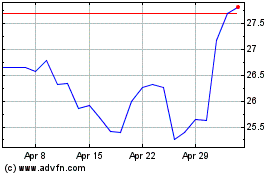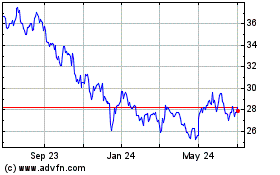Drug and Diagnostic Companies Issue Joint Declaration on Antibiotics
January 20 2016 - 7:29PM
Dow Jones News
By Denise Roland
More than 80 drug and diagnostic companies have committed to
working together to develop new antibiotics, while calling on
governments to improve the financial incentives for doing so, in a
declaration released at the World Economic Forum in Davos,
Switzerland.
The group, which includes pharmaceutical giants such as Johnson
& Johnson, Novartis AG, Roche Holding AG and Pfizer Inc., said
combating a "dramatic" increase in drug-resistant bacteria required
governments to create market incentives for developing new
antibiotics and diagnostic tools.
The threat of superbugs has moved up the political agenda in the
past year, with the White House issuing an extensive plan to fight
superbugs and U.K. Prime Minister David Cameron warning they could
"cast the world back into the Dark Ages of medicine where treatable
infections and injuries will kill once again."
The pharmaceutical industry has largely reduced or abandoned
efforts to develop new antibiotics due to the low likelihood of
getting a return on investment. Any new antibiotic would need to be
used sparingly to conserve its effectiveness, meaning sales would
be slow.
Signatories to the declaration said breaking the link between
revenue for new antibiotics and the amount of use would help
address this problem, as would mitigating the financial risk for
developers. They said possible approaches included giving
developers a lump sum for launching a new antibiotic or
insurance-like payments to companies for supplying innovative
drugs.
They added that in developed markets, governments should be
prepared to pay for new antibiotics and diagnostics with prices
that "reflect the benefits they bring."
They also called on governments to bolster efforts to conserve
existing antibiotics by ensuring health systems prescribe the drugs
only when necessary. The group said one way this could be achieved
would be providing better reimbursement for rapid diagnostic tools
to curb antibiotic use in situations where they wouldn't be
effective, such as viral infections.
Jim O'Neill, the former Goldman Sachs economist who is running a
review on antimicrobial resistance for the U.K. government, called
the declaration a "major step forward" in establishing a global
response to the threat of drug resistance.
"I'm really impressed that such a wide range of companies have
been able to agree on a common set of principles and commitments
across these important issues," he said. "This is a level of
consensus that we have not previously seen from the industry on
this topic."
The group said it would review and update the declaration every
two years "to reflect progress and changing priorities," and
invited other companies to add their signatures to the
declaration.
Write to Denise Roland at Denise.Roland@wsj.com
(END) Dow Jones Newswires
January 20, 2016 19:14 ET (00:14 GMT)
Copyright (c) 2016 Dow Jones & Company, Inc.
Pfizer (NYSE:PFE)
Historical Stock Chart
From Mar 2024 to Apr 2024

Pfizer (NYSE:PFE)
Historical Stock Chart
From Apr 2023 to Apr 2024
